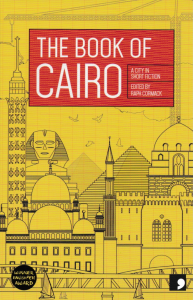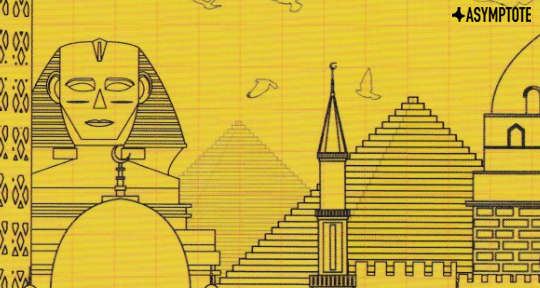
The Book of Cairo, A City in Short Fiction, edited by Raph Cormack, translated from the Arabic by multiple translators, Comma Press, 2019
The Book of Cairo, A City in Short Fiction, edited by Raph Cormack, is the newest addition to the “Reading the City” series published by Comma Press (Manchester, UK), collecting stories by local authors from cities around the world. Each story in the book (like those of the other books in the series) is translated into English by a different translator, which makes the book even more multi-vocal, introducing readers to not only writers, but also to translators working from a particular language into English, in this case Arabic.
The stories (except for one) were originally published between 2013 and 2018, making them of the present time and place, and giving us access into the current literary scene of Cairo. The authors are all born in the late 1970s and the ’80s, which makes them part of the young, hopeful generation who took part in the Tahrir Square protests, who made the Arab Spring possible, and who imagined a different future for their country. And it is through the diverse, imagined worlds in the present collection that they investigate the present moment of a city mutually rooted in history and moving toward the future.
From drivers (“Gridlock”) to a bureaucrat (“Whine”) to a doctor (“Talk”) to an obituary columnist (“The Soul at Rest”) to a man working at a video rental shop (“Two Sisters”) to a policeman (“Hamada al-Ginn,”), the characters in the stories come from a wide range of occupations and take us into different corners of the city.
“Gridlock” (by Mohamed Salah al-Azab, trans. Adam Talib) takes us right into the craziness of the traffic in Cairo. The style of the narrative mirrors the sense of moving or being stuck in traffic, going from one vehicle to the next, from the microbus to the Chevrolet Optra to a taxi and to the people in between them. It emulates the sensation of exchanging short glances with people while inside a car or being a pedestrian looking into one. Sometimes you meet strangers you’ll remember for a long time. Sometimes you even come face to face with someone you know. I’ve never been to Cairo, but the traffic seems to be such a central aspect of the city’s existence—the way Tehran’s traffic is—so it is an interesting choice to start the collection here in the streets and amongst its knots of humans and cars.
“Talk” (by Mohammed Kheir, trans. Kareem James Abu-Zeid) explores the concept of gossip in a society where oftentimes the collective overrides the individual. It plays with the effects rumors have on a person’s life, creating an absurd world with a tragicomic, dystopian mood that still feels realistic. A similar theme—the ways one is connected with/disconnected from others in society—is explored in other stories as well. For example, in “Into the Emptiness” (by Hasan Abdel Mawgoud, trans. Thoraya El-Rayyes), the narrator thinks, “I believed they were entitled to see me that way, as long as I also allowed myself to think of them my way.” The narrator sees himself as “a wall that cannot be penetrated by pleasantries,” and yet throughout the narrative, we can feel his desire for overcoming loneliness, for connection.
In “Whine” (trans. Raphael Cohen), writer Hatem Hafez introduces us to a man recently promoted to head of the department. Instead of feeling happy or thinking about his duties, he feels disoriented, jealous of his ex-coworkers, “missing the warmth afforded by a large shared office teeming with government employees, all making their amiable commotion.” So he busies himself with obsessively rearranging the furniture in the room. “This solution was a stroke of genius, the product of a moment’s inspiration. No, it was more than that; he took it as a sign of his innate superiority that had been summoned forth by the exigencies of his new position. He was the right man in the right place.” The word choice and the tone transmitted through Cohen’s translation reveals the farce of the situation, making us wonder what kind of leader he is going to be.
Love is another theme running through some of the stories. From “Gridlock” to “The Other Balcony” (by Nahla Karam, trans. Andrew Leber) to “Two Sisters” (by Eman Abdelrahim, trans. Ruth Ahmedzai Kemp) to “Siniora” (by Ahmed Naji, trans. Elisabeth Jaquette), the stories delve into the theme with different approaches. The diversity here, from teenage love to vampirish characters to a man in love with a hashish-making goddess, is a good representation of what is possible (realistically and imaginatively) in a city of more than a dozen million residents. “Our relationship—or ‘things as they stood’—was pretty tenuous, fragile, the result of past events and old losses. Sometimes I thought that ‘things as they stood’ weren’t one hundred percent real. Maybe they were a figment of someone’s imagination, the daughter of an illusion, fantasies born of loss and loneliness,” says the narrator of “Siniora.” And aren’t all relationships like that in one way or another?
Then there are other themes as well: death and judgment (“The Soul at Rest,” by Hend Ja’far, trans. Basma Ghalayini), the attempt to leave the city (“An Alternative Guide to Getting Lost,” by Areej Gamal, trans. Yasmine Seale), and seeking the Truth, which falls, of all people, upon a policeman (“Hamada al-Ginn,” by Nael Eltoukhy, trans. Raph Cormack): “The Truth has gone missing and your mission is to find it again.” He is given only two days by his General to find it, because unlike the good old days, “People are confused now . . . We can’t allow this situation to become any more serious than it already is.” But of course things are not as simple when it comes to the Truth/truths. The absurdity of the story and the fact that the Truth “was exactly how Haitham had imagined it would be . . . It might not necessarily have been real but it was certainly shocking” make us wonder how successful the search has really been.
While the translations in the collection maintain a cohesion throughout, they also manage to reproduce the uniqueness of each author’s voice and style: the dark humor of some, the sadness of others; the bitterness of some, the playfulness of others.
In the introduction, Cormack writes, “This book tells the story of a city that is struggling to forget itself.” He, however, adds later, “[Cairo] is also a city of great marvels, depth and vitality,” which are qualities that the city perhaps doesn’t want to forget, but rather tries to preserve. It is this very paradox that is at the heart of the book, the need to forget and move on while at the same time holding on to what makes the city what it is.
And The Book of Cairo invites us to this very complex city without committing the crime of exoticizing it. Marwa Helal, in her beautiful poem “poem for brad who wants me to write about the pyramids,” exposes expectations from her to bring “more of egypt” into her writing, meaning the desire for “the pyramids” and “a wonderfully exciting place,” which really means playing the exotic card, recreating the clichés. She also provides a footnote at the end of her title, a quote from Borges where he speaks about “what is truly native” and gives “local color” to a piece of writing. Borges notes the absence of “camels” in the Koran and says, “[The Koran] was written by Mohammed, and Mohammed, as an Arab, had no reason to know that camels were especially Arabian; for him they were a part of reality, he had no reason to emphasize them . . . he knew he could be an Arab without camels.” This all applies to The Book of Cairo as well. It has no need for camels or pyramids or an exaggeration of whatever the Western eye is looking for. The collection presents us with short stories that present life in all its intricacies, passed through the filter of imagination, as it should be in literature. Reading them feels like sitting in a café in Cairo with young literary men and women, listening to their stories that dig deep into what Cairo is and is not. You might like some more than the others, you can agree or disagree with them, but at the end of the night, you are happy to have spent the time there, to have travelled the city alongside them.
Don’t miss other books in Comma Press “Reading the City” series, including The Book of Tehran (edited by Fereshteh Ahmadi), The Book of Khartoum (edited by Raph Cormack and Max Shmookler), and The Book of Gaza (edited by Atef abu Saif) among others.
Poupeh Missaghi is a writer, a translator both into and out of Persian, Asymptote’s Iran editor-at-large, and an educator. She holds a PhD in English Creative Writing from the University of Denver, an MA in Creative Writing from Johns Hopkins University, and an MA in Translation Studies. Her nonfiction, fiction, and translations have appeared in numerous journals, and she has several books of translation published in Iran. She is currently a visiting assistant professor at the Department of Writing at the Pratt Institute, Brooklyn. Her debut novel, trans(re)lating house one, is forthcoming from Coffee House Press in February 2020.
*****
Read more reviews on the Asymptote blog:

